For almost a decade I’d dreamed of this, I thought, gazing into the cot with tears pouring down my face. For so long, all I wanted was to be a mother, to make my partner a father. Now my dream had come true. And it was a nightmare.
After a serious relationship had ended when I was 35, I’d worried I’d never meet anyone else and never have my own children. I did everything to make it happen. At 36, I froze my eggs; at 40, still single, I tried to conceive on my own with donor sperm.
Then I met someone when I was least expecting to, and we tried together, enduring IVF, a natural pregnancy and a miscarriage before deciding to go down the route of finding an egg donor. When, at 44, on my eighth cycle of IVF, and my first using a donor egg, I finally got pregnant, and stayed pregnant, I didn’t dare to believe my luck.
But after a relatively straightforward birth — a planned C-section, based on my age and the size of the baby — our son was here.
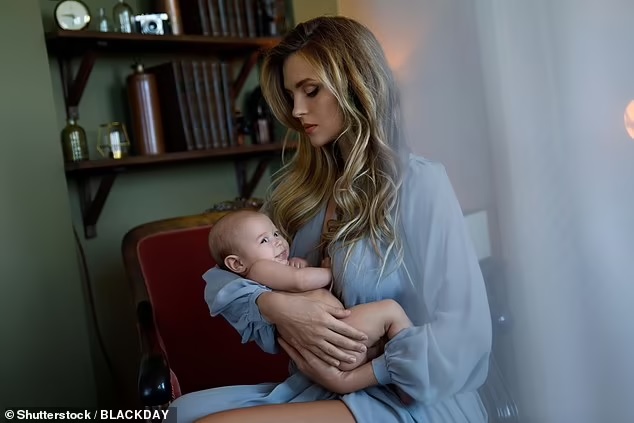
When they placed him on my chest, I didn’t feel that rush of love people talk about. I mostly felt disbelief that after so long, here he was — he was ours, we were parents. I do remember, three days later, in a post-natal bubble of euphoric hormones, standing in happy tears over his cot as he slept and marvelling at this miracle we’d made. ‘He’s so perfect,’ I whispered, in awe.
But four weeks later I was struggling to remember that feeling. Because what I felt as I stared at this screaming baby, the baby I’d wanted so, so much, the baby that I’d invested so many years of my life, and so much money — I guess around £100,000 all told, but I stopped counting after I hit £50,000 — in making a reality, wasn’t awe. It was resignation, resentment, horror and abject misery.
‘There is not one part of this that I’m enjoying,’ I sobbed.
And then I’d feel racked with guilt. Guilty for having these unnatural, unmotherly feelings. Guilty that this poor, defenceless baby had been landed with a mother like me and not someone better. Guilty because I knew there were millions of women out there who would swap places with me in a heartbeat.
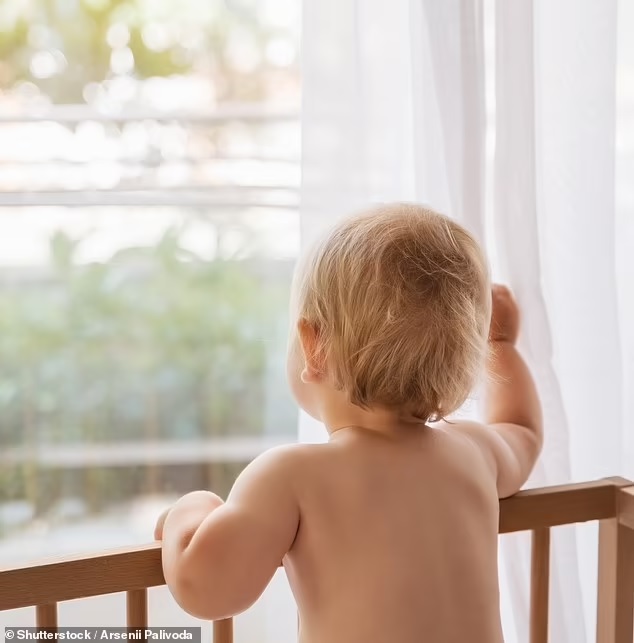
I know because I was one of them.
I spent years resenting the complaints about the trials of motherhood from — to my mind — ungrateful women. Didn’t they know how lucky they were? Didn’t they know that I’d give anything to be in their place? Didn’t they realise what a luxury it was to be able to complain of sleepless nights, and not having a moment to themselves?
I would have given anything to be in that position.
And so it was during those early weeks that the phrase ‘be careful what you wish for’ ran on a loop inside my head.
With the benefit of hindsight, and more sleep, I can rationalise those early feelings. I don’t think I had post-natal depression, a condition which affects one in ten women, but I do think that the perfect storm of lack of sleep, hormones and recovering from major abdominal surgery compounded the fact that nothing can prepare you for the seismic shock that is having a tiny baby.
‘There is not one part of this that I am enjoying,’ I sobbed
And, ironically, given how long I’d been trying, I was less prepared than most. Partly because with every failed IVF cycle, the goal had shifted. I’d started out wanting a child, then I just wanted to get pregnant.
And as that seemed increasingly unlikely, I didn’t allow myself to think about what life with a baby might actually look like.
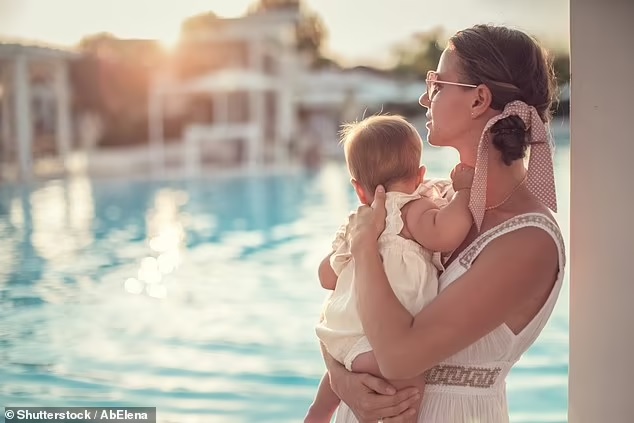
My closest friends who might ordinarily have confided in me about their post-natal emotional struggles felt, rightly, that it would have been insensitive to complain to me, given how desperately I was trying to be where they were.
When I did hear new mothers bemoaning their lot, I simply thought that it would be different for me.
If I’m really honest, I hadn’t anticipated loving the tiny baby phase. I’d never found very little babies appealing, far preferring children when they became more interactive, when they could smile, talk even.
But I could never have predicted how utterly miserable the early stage would make me feel.
On paper I had nothing to complain about. While not an ‘easy’ baby, and a very reluctant sleeper, my son had no serious health issues, and he and I both took well to breastfeeding, which so often is a source of problems in the early days.
I was mourning the carefree existence I’d had before
Then why was I so unhappy? It would be easy to assume the problems stemmed from the fact the baby and I didn’t share any DNA, but somehow I knew instinctively that wasn’t it. And part of the reason I was so sure was because my partner, our son’s biological father, felt the same way I did.
Our emotions ebbed and flowed, with each of us taking turns to reassure the other, with varying amounts of conviction, that it wouldn’t always be like this, that it would get better.
But there were also nights we stared at each other in mutual horror, wondering what on earth we’d done.
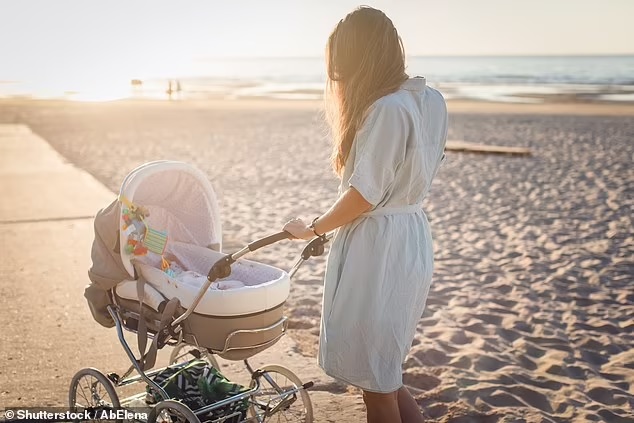
And I think that was at the heart of it all: the feeling we’d had a really lovely life that we had just exploded in a way that seemed utterly irreversible. I was mourning the relatively carefree, spontaneous existence we’d traded to become slaves to this demanding master who never seemed happy — and never gave us a day off.
There were times I thought I hated him. Although really I hated the situation and, more than anything, I hated myself.
How did I hate myself? Let me count the ways. I hated myself because I had wanted this, so I had no one to blame but me.
I hated myself because after years of searching I’d found a wonderful man and now I’d ruined our relationship. Forget intimate and leisurely candlelit dinners, we couldn’t even eat a meal at the same time because someone had to hold the baby.
I hated myself because I was clearly a heartless monster for feeling the way I did.
Something that was driven home with every message asking ‘Are you loving being a mummy?’ No, I wanted to reply, I’m loathing it.
I hated myself for being the only mother in existence ever to feel this way. (I wasn’t, as I later found out when I confided in friends, but at the time I felt that no one had ever felt the way I did.) And I hated myself for being so ungrateful.
Since 2014, when I was in the vanguard of women freezing their eggs for ‘social’ rather than medical reasons, I’d been documenting my experiences in the world of fertility on my anonymous blog, eggedon blog.com.
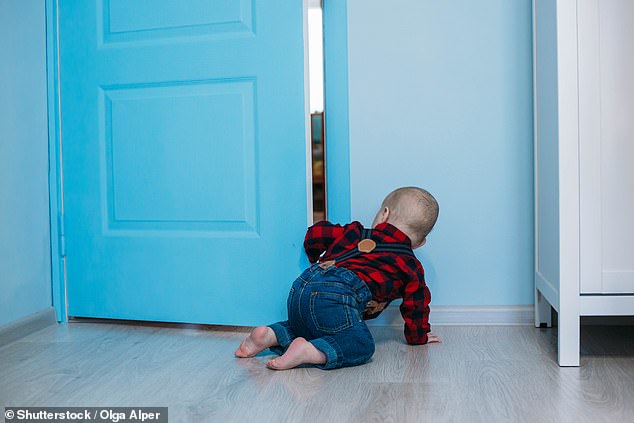
Tens of thousands of readers had followed me from those early days, and I knew from the many comments and messages I’d received over the years that many of them were just like me.
Over email, and sometimes over the phone, I’d counselled hundreds of women who initially wanted to talk about egg freezing, then later to discuss the decision to try to conceive as a solo mum, and most recently the emotions involved in deciding to use a donor.
And it was a reciprocal relationship. These women might not have known my real name, but they knew more about me than most of my family did.
They recognised my despair when my hard-won frozen eggs failed to fertilise. They shared my joy when, after five cycles of IVF as a single woman, I met a man who seemed to take it all in his stride. And the elation that they felt when the first cycle of IVF with a donor egg worked was palpable through the pixels.
I knew what it was like to share in the trials and triumphs of a stranger. I, too, had devoured the blogs and Instagram posts of women whose struggles with fertility mirrored my own.
I knew how it felt to revel in the good news — ‘she was the same age as me and she got pregnant!’; ‘she’d done ten cycles of IVF and finally it worked!’ — while simultaneously feeling that sharp and shameful ache of jealousy and resentment that it wasn’t me.
As our son grew he became a source of joy, not misery
So having finally won my own personal game of fertility snakes and ladders, the realisation that it was a hollow, unwanted victory felt as though I were betraying all of them as well.
But, according to chartered psychologist and parenting specialist Catherine Hallissey (catherinehallissey.com), the way I was feeling wasn’t as unusual as you might think.
‘It’s difficult to talk about how common this reaction to the culture shock of motherhood is as it’s so taboo to admit that things aren’t how you thought they’d be,’ she says.
However, she believes that the combination of chronic sleep deprivation and the loss of identity felt by many career women when they have had a child contribute to many new mothers feeling this way.
‘I really feel that what is at the heart of it is the lack of support new mothers feel in the absence of the parenting village our mothers, and especially our grandmothers, had,’ she says.
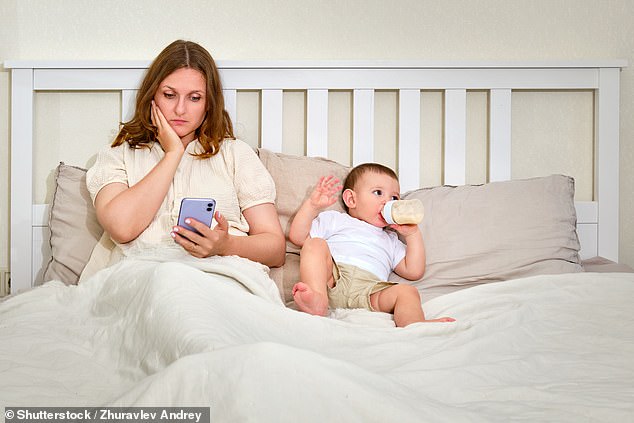
Add to that ‘the binary thinking that creates the idea that being a good mother means loving every second of the experience, and you deny women the complexity and range of human emotions that’s inherent in being a parent, resulting in guilt and shame’.
She sums up beautifully how I felt, although it wasn’t the first time I’d been plagued by a sense of disconnection from the women I’d grown to think of as my people. Having spent so long as a fully paid-up member of the childless-but-not-by-choice community, when I finally did get, and stay, pregnant, and later when I had the baby, I had a strong sense of survivor’s guilt.
After all, these women had been my sisters-in-arms. Not just the ones I didn’t know who had supported me through the blog, but the ones I knew in real life. The friends who, like me, had gone through the very specific angst of dating post-40 and knowing you still wanted a child.
But once I was visibly pregnant, it was as if a switch had been flicked. I’d suddenly joined another club. I’d become one of the women that other women told about their pregnancies. Suddenly everyone from close friends to strangers in the street would strike up conversations about cravings, and kicks, and elasticated waists.
Only none of it felt entirely real. There was a cognitive dissonance to it that I couldn’t reconcile. Maybe it was partly because acknowledging it felt like tempting fate. Because I knew how easily it could slip away from me.
You can’t spend nearly a decade mired in the stats and stories of infertility and assume everything is going to be fine.
It had taken me so long to get to that point that I was never able to wholly shake the sense that I didn’t belong, that I was still on the other side of the fence.
I imagine that it’s rather how it feels like to have lost a lot of weight and suddenly be one of those skinny women who gets treated differently because they have an enviable figure. The outside world reacts to how you are now, but in your head, you’re still the person you were before. I was a pregnant infertile person, straddling two worlds and not belonging in either.
I clearly remember a well-meaning mother who started waxing lyrical about how I was about to experience a love that I’d never known before.
Someone else told me that I’d fall in love with my partner in an entirely different way when I saw him become a father. And when I heard those things I nodded and smiled, while clenching my fist so hard that my fingernails made indents in my palm.
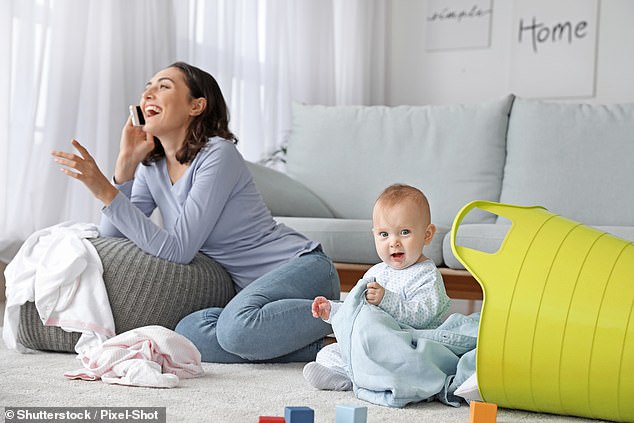
Because I have always hated that narrative, that idea that you never really know love, tiredness, or whatever emotion until you become a parent. That suggestion that, without a child, you are a fraction of the person you could be . . . And so I bristled silently on behalf of the woman I was before I became pregnant, and all the women like me.
I’m sure this fetishisation and deification of motherhood, which has always made me uncomfortable, contributed to the guilt I felt about my feelings in those dark, early weeks.
Back then I couldn’t imagine how I would ever enjoy, rather than endure, motherhood. People said things would get better — at six weeks, at ten weeks, at three months, at six months . . . and while that’s scant comfort when you don’t know how you’re going to get through the next six hours, they were right.
As our son started to smile, and later laugh — and crucially as we all got more sleep — he began to become a source of joy, rather than misery: the way his face lights up when I walk into his room in the morning; seeing him learn new skills every day, piecing together the world and his place in it; the rituals that we have developed as a family.
I’m not yet at the point of using superlatives to describe motherhood — maybe one day I’ll view it as The Best Thing I’ve Done.
But I think all those years of not knowing if I’d ever be a mother made me realise that there are many ways to live a life and find joy in it.
The life we have today is different from the one we gave up. It’s not worse, as I thought it was in the depths of my misery; it’s not better, as the parenting evangelists would have you believe. It’s just different. And maybe as an infertile mother, with a foot in each camp, it’s inevitable that I would see it that way.
Share or comment on this article: Woman breaks taboo as she admits ‘loathing’ being a mum – after spending £100,000 to have a baby.
